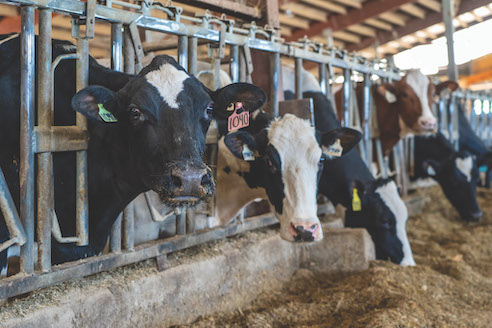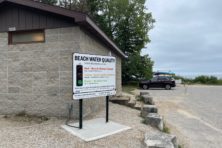Water on Their Minds: organizations with water quality initiatives or priorities
- Share
- Tweet
- Pin
- Share

What’s the Big Stink?
The League of Women Voters Natural Resources Committee
The League of Women Voters of Door County (LWVDC) natural resources committee has planned a public forum following six months of study into manure management in Door County and its impact on the health of surface and groundwaters.
“The Big Stink: Manure Management and Water Quality in Door County,” will feature a panel of regulatory, farming and environmental experts on Tuesday, April 23, at 6:30 pm at Crossroads at Big Creek, 2041 Michigan Street, Sturgeon Bay.
Door County is home to more than 200 agricultural operations, many fertilizing their crops with organic materials generated by farm animals. The practice, known as manure spreading, increases crop yields, helps reduce farm waste – and is often a confusing and contentious topic, said to Virge Temme, chair of the LWVDC’s natural resources committee and moderator of the upcoming forum.
“There’s more than meets the eye – and nose – when it comes to manure spreading,” Temme said.
The practice is not without risks because manure contains phosphorus and nitrogen, and each used in high concentrations or overuse can result in contamination of surface or ground waters, threatening the health of wells and waterways and promoting growth of unwanted algae, water plants and bacteria.
The LWVDC initiated a study to better understand the state of Door County’s soil and water quality, dispel possible misconceptions and shine a light on the issues. Over the past six months, members of the natural resources committee interviewed local environmentalists, county soil specialists, Wisconsin Department of Natural Resources regulators, commercial manure spreading operators and farmers.
“Our study revealed some good news about local soil and water health as well as the risk-mitigating steps being taken by the local farm community and regulatory agencies,” Temme said.
Experts scheduled to speak at the forum include:
• Duane Ducat, Deer Run Dairy, Kewaunee, president, Peninsula Pride Farms
• Jeremy Heims, Heims Hillcrest Dairy, Algoma, board of directors Wisconsin Custom Operators, Peninsula Pride Farms and Professional Nutrient Applicators Association of Wisconsin
• James Salscheider, DNR wastewater specialist, Door, Brown and Kewaunee counties
• Timothy Dahl, conservationist, Door County Soil and Water
• Sara Fry, DNR private water reporting and enforcement coordinator, Wisconsin DNR
• Dean Hoegger, president and executive director, Clean Water Action Council Forum
Attendees will learn about many facets of soil and water management, such as reasons for using organic materials to nourish soil and grow crops; rules and regulations affecting manure spreading; steps taken by farmers to guard against over-application and runoff while maintaining crop yields; monitoring and enforcement by local government; and current and emerging concerns around phosphorus contamination.
A Q&A session will immediately follow the presentation. The forum is free, and reservations are not required. For more information, go to lwvdoorcounty.org.
The Door County Environmental Council supports many different projects and initiatives that protect water quality, including signs like these – this one at Baileys Harbor Ridges County Park – that alert swimmers about the water’s quality based upon a summer-long testing program from the University of Wisconsin-Oshkosh. File photo by D.A. Fitzgerald.
All About Water
The Door County Environmental Council
The Door County Environmental Council (DCEC), founded in 1969 to address a variety of water-quality issues, supports beach water monitoring and testing, the reduction of nonpoint source pollution, the implementation of best practices in agriculture, the regulation of large-scale farms, phosphorus runoff reduction, the protection of wetlands and waterways, and safe and clean drinking water.
DCEC President Steve Eatough said the council supports the installation of water quality signs at Door County beaches that alert swimmers when conditions are unsafe due to the detection of high levels of E.coli bacteria.
Eatough said the DCEC believes education is key to addressing issues related to water quality with a goal to do what’s best in the long term.
Though the overall water quality in the county is “quite good,” he said, he also said he does not believe it’s “alarmist” when the DCEC points out problem areas, such as where waters are impaired by high levels of phosphorus, so that remedial action may be taken.
Pilot Island is a ‘Smelly, Polluted Eyesore’
Says the Washington Island Sportsman’s Club
The Washington Island Sportsman’s Club (the Club) has focused its efforts on a water-quality hotspot in Door County surrounding Pilot Island. The Club wants the U.S. Fish and Wildlife Service (FWS), which owns the 3.5-acre island off the tip of the Door peninsula, to restore the island to how it existed decades ago when it operated as a U.S. Coast Guard lighthouse station. The FWS uses the island as a bird-nesting sanctuary, and has given no signal it intends to change that use.

The Club has characterized Pilot Island as having turned into a “smelly, polluted eyesore.” In addition to the impact thousands of birds nesting there have had on the island itself, club members have also criticized the effect the birds are having in the water.
Concern about the fecal contamination on Pilot Island and what it’s doing to the water, land and the air prompted club members Dan Nilsson and Rip Koken to contact the University of Wisconsin-Oshkosh (UWO) about its beach water testing program.

UWO agreed to test the water and its results from August 2022 found levels of E. coli bacteria that would warrant closing a beach and are considered unsafe for humans to swim in multiple places around the island.
The Door County Board of Supervisors also focused on the degraded water quality surrounding the island when it passed a resolution last year that urged the FWS to remediate and remove the future negative impact of the birds residing on the island.
No Friends of Drawdowns or Water Contamination
The Friends of the Forestville Dam
The Friends of the Forestville Dam (the Friends group) in southern Door County has not only addressed issues related to the dam – the group last year successfully petitioned the Wisconsin Department of Natural Resources to require the County of Door to obtain a permit before drawing down the millpond again in the future – but also the impacts some agricultural practices pose to water quality.

The Friends have alerted the public about the potential for groundwater contamination in southern Door County, given the shallow soil depth above bedrock in many areas. The group raised concerns last year about spreading large amounts of manure as it related to expansion plans by the Town of Forestville-based S&S Jerseyland Dairy when the large-scale farming operation went through the process of renewing its Wisconsin Pollutant Discharge Elimination System permit.
The Friends’ Robert Sijgers also points out the group still continues after many years to monitor water quality in the Door County watershed part of the Ahnapee River with biweekly sampling of locations upstream of the Forestville millpond, the millpond itself and immediately downstream of the dam.

